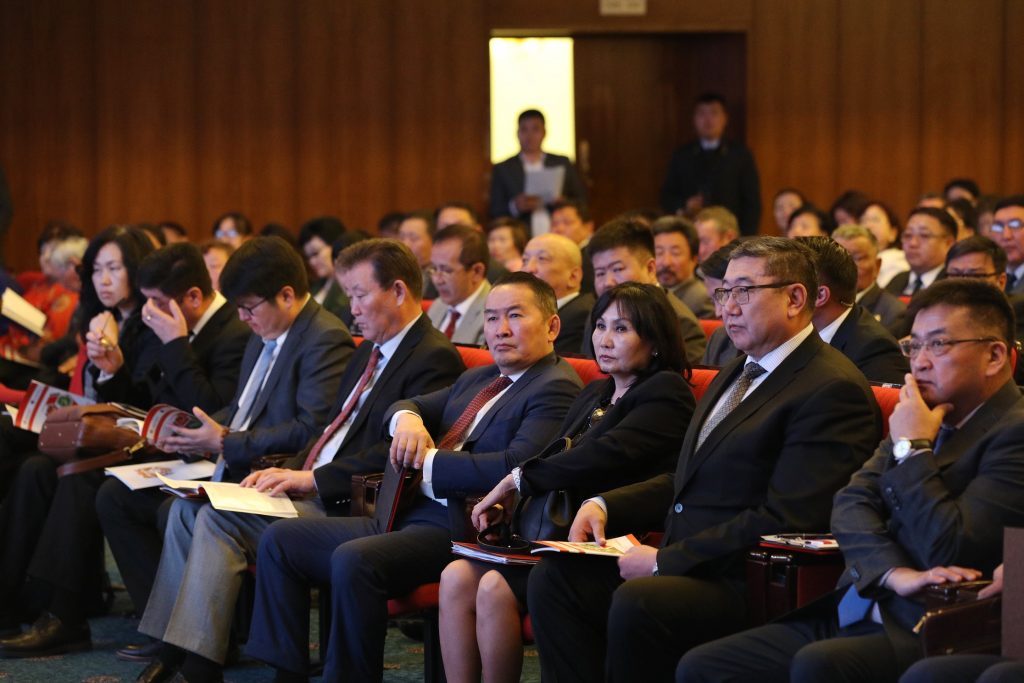OPENING SPEECH BY PRESIDENT KHALTMAAGIIN BATTULGA AT THE DISCUSSION ON SECURITY OF MEAT AND VEGETABLE SUPPLY
President of Mongolia Khaltmaagiin Battulga delivered an opening speech at the discussion themed Security of Meat and Vegetable Supply that was co-organized by the National Security Council and the Ministry of Food, Agriculture, and Light Industries on May 6.
President Battulga said:
“Good day to all of you!
We are gathered here today to discuss the supply of meat and vegetable and its security, which is one of the pressing issues in Mongolia, and forward the recommendations for follow-up actions and solutions to the state institutions in charge of policy- and decision-making, including the National Security Council, the Parliament, and the Cabinet.
Ensuring food security is a matter of public concern, and no individual or institution should be left behind.
The complex term of food security is based on three pillars. These are, first, availability of food from multiple sources; second, stable access to healthy, guaranteed, safe food regardless of physical and economic barriers, and third, food and water sanitation, hygiene, and utilization.
With our transition to market economy from a system of preparing, processing, and supplying food 30 years ago, a notion that everybody and every household is food producer was widely spread, and at the same time, everybody took the liberty of becoming food producer, importer, and supplier.
Due to lack of centralized management and coordination between the food sector policy and implemented measures and the direction of business activities over the last two decades, the three defining pillars of food security are in a state of instability today.
We are well aware that the government, food manufacturers, specialized institutions, and the public are making substantial efforts to restore and reorganize the system that has already been disintegrated.
Despite of the various decisions taken at all levels of government aimed at reforming the legal environment, introducing the good practices of developed countries, and increasing the manufacturing of agricultural products, based on recommendations of the industry experts, policy-makers, workers, and food network stakeholders, we haven’t seen tangible outcome.
Unless we approach our challenges with a comprehensive view, identify the solutions, and coordinate our future policy, decisions, and actions to be taken, I am cautious that we could still be in a systemic malfunction after a couple of decades, talking about the same problem and doing the same work.
We need to reflect on the fact that we haven’t yet found and implemented the solution to overcome the challenge of regular inconsistency in meat and vegetable supply in spring and summer seasons because meat preparation and harvesting have historically been dependent on weather patterns and seasonal characteristics.
As we are living in the 21st century, which is characterized by the rapid development of information technology, such poor state of industry and inconsistency in supply is not a good outlook. In this situation, the right policy and optimal decision are absent, and solutions are plenty if commitment and dedication are present.
We need to pay close attention to the legal environment in the food sector, all stages in the food network, coordination of every measure taken at these stages, investment towards the development of the food industry and new vegetable sort that are suitable to the climate of Mongolia, taxation policy that encourages domestic manufacturers, and the education of food manufacturers and consumers.
When it comes to the availability of multiple sources of food supply, it has always been inconsistent, and we still largely rely on import in supplying the domestic demand of vegetables. In fact, the volume of annual domestic demand of potatoes and vegetables is not very huge, it is about 370 thousand tons. Potatoes constitute 180 thousand tons of this volume and other vegetables 190 thousand tons. We have sufficient resources for cultivation and production of this amount. But only 42 percent of total vegetable demand was supplied from domestic production in 2018. We have had the capacity to fully supply the domestic demand of potatoes since 2009, but we still bring them in. As for the other vegetables, over 90 percent of demand is supplied by import. We now have to discuss the ways to reduce the monopoly power of Bars Market where imported vegetables are reserved, supplied, stored, distributed, and transported from and the price of vegetables is set.
In order to provide our citizens with fresh vegetables in all seasons, we don’t have to a choice but to develop greenhouse agriculture. Therefore, we must apply a comprehensive approach which includes actions such as developing advanced greenhouse industry, capacity building for greenhouse farmers, government assistance in the introduction of cutting-edge technology in Mongolia, building a storage and marketing network, and improving the utilization of vegetable storerooms and warehouses.
In the first four months of 2019, many incidences of food poisoning and foodborne infections were recorded, affecting 337 people, and this shows the necessity to reform the system of supervision and inspection on food safety, change the methodology on regular inspection, and fix the perversion in the legal environment. According to the Law on Food Safety, risk-based food inspection was legalized in 2013. However, the Law on State Supervision and Inspection states that inspection must be announced at the start of a year and conducted in the given time frame, thus laying the foundations for ineffective and symbolic inspection by the State Specialized Inspection Agency. In other words, there is still a risk that those working in the manufacturing, processing, and marketing stages of food network could only comply with the standards during the planned inspection period and do otherwise for the rest of the year. Therefore, we must revise the law, eliminate this risk, and end this ineffectiveness with pragmatic inspection at all stages of the food network.
In 2017, a National Forum on Food Security was held by my initiative, and as a result, a recommendation comprising 17 directions was forwarded to government institutions. However, the implementation was unsatisfactory, and no tangible results were produced.
In conclusion, the basic measurements of food security aren’t fully complied with in Mongolia. There is plenty to do, resolve, and improve. I would like to remind you that the active and responsible participation of all stakeholders of the food industry is important in fully and consistently supplying safe food to our population.
I hope that the participants of the discussion will focus on engaging the public in ensuring the implementation of food industry laws and food security and preventing possible risks, as well as propose tangible solutions to the Cabinet and be productive.
I would like to express my readiness to instruct and work adamantly with the Cabinet towards implementing the recommendations and solutions that were produced as a result of the discussion and seeing solid outcome.
I wish you success.”



